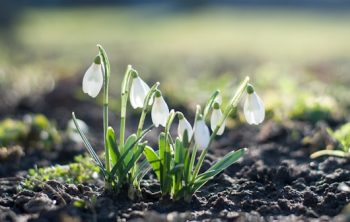Adding coffee grounds on tomato plants may benefit your crops. Here’s a few reasons to try it!
Organic gardening can seem impossible when you’re starting out. The market is flooded with synthetic fertilizers, and gaining knowledge about organic ones takes time. Coffee grounds are a quick, easy-to-use organic fertilizer that even beginners can master.
In this article, I explain how you can keep your garden organic with coffee grounds on your tomato plants, what coffee does for your
Organic Gardening With Coffee Grounds As Fertilizer For Tomatoes
Although not scientifically proven, many gardeners believe coffee grounds benefit their tomato plants.
There’s no concrete evidence to show coffee grounds make tomatoes grow faster or kill pests around them. However, gardeners have taken it upon themselves to test this theory out.
Many tomato plant enthusiasts report a difference in their tomato gardens compared to when they weren’t using coffee grounds. Coffee grounds are a popular fertilization method for organic gardening.
Will Coffee Grounds Kill Plants?
Coffee grounds won’t necessarily kill your plants, but they may hold some disadvantages.
Tomato plants love acidic
Coffee grounds can leave other crops without the nutrients they need and suck the water in the
Your plants may even dehydrate. Coffee grounds group together to form a thick, hard layer. This can stop water from running through the
Do Coffee Grounds Add Nitrogen To Soil ?
Apart from making the
Coffee grounds contain nitrogen, phosphorus, and potassium. These vital minerals fertilize the
Reasons To Add Coffee Grounds On Tomato Plants
Although none of these benefits have been proven, you can still add coffee grounds to the
Coffee Grounds Contain Vital Minerals
Coffee grounds are packed with minerals like nitrogen, calcium, magnesium, potassium, phosphorus, iron, and zinc. Adding them to your

Coffee Grounds Make Soil More Acidic
Tomatoes thrive in acidic
You should use coffee grounds mixed into peat moss for the best results. The acidity in the coffee grounds will reduce over time.
Take Out Time to Also Read:
Coffee Grounds May Prevent Fungal Diseases – Coffee Grounds On Tomato Plants
Some harmful fungal diseases that affect tomato plants include anthracite fruit rot and early flight. Many gardeners claim that coffee grounds help combat these diseases and keep their plants healthy.
Coffee Grounds May Keep Pests Away
The love slugs have for tomato plants is one-sided. These critters can harm your harvest, leaving ugly and inedible tomatoes behind.
Researchers tested the effect coffee grounds have on slugs, and it turns out that they don’t want to come near it. There’s no reason to not give this slug repellent a try!
Cats also don’t like the smell of coffee, so they won’t use your
Caribou Coffee, Medium Roast Ground Coffee – Caribou Blend 20 Ounce Bag
How Do You Add Coffee Grounds To Tomato Plants?
There are many options if you want to add coffee grounds to your organic garden. Here are some ways you can use it to benefit your tomato plants:
Mixing Coffee Grounds Into The Soil
You can simply mix some coffee grounds into your
The coffee grounds will ensure nitrogen levels in your
Just be careful to not add too much to your
Use Coffee Grounds In Your Compost – Coffee Grounds On Tomato Plants
Mixing coffee grounds into your already established compost is the best and safest way to use it. This will ensure your plants receive the benefits of coffee grounds and the compost you choose.
Your final compost mix should contain a 1 to 4 green to brown ratio. Coffee grounds are considered a green compost material.
Use Coffee Grounds As A Mulch
Mulch helps keep moisture in the ground, prevents weed growth, and promotes a healthy composition. Mixing coffee grounds into your regular mulch will ensure your tomato plants get extra nitrogen.
Add Coffee Grounds In The Water
You can create a liquid fertilizer by making coffee with coffee grounds and water. You should add no more than 2 cups of ground with 5 gallons of water.
I suggest spraying it on your tomatoes at least once a week.

Wrapping Up – Coffee Grounds On Tomato Plants
Coffee grounds are relatively cheap, easy to get, and even easier to use in an organic garden. Adding it to your tomato beds can greatly benefit them and help you harvest more healthy tomatoes than ever before!
While no concrete evidence has been penned about the use of coffee grounds on tomato plants, many gardeners live by it. It’s a key ingredient in keeping tomato plants healthy when organic gardening. If you keep the ratio of coffee grounds to other
I hope you found this article helpful and enjoyed reading it. If you have more questions about using coffee grounds in your garden, ask them in the comments.
Natasha is an avid gardener and lover of nature. She grew up in a rural area surrounded by flowers, trees, and birds. She was inspired by this environment to grow her own garden. Natasha spends her weekends tending to her garden and taking care of her plants. She also enjoys hiking and exploring different areas to find new and interesting plants to add to her collection. Natasha‘s love of gardening has also inspired her to take classes and study horticulture. Her knowledge of plants, flowers, and trees is extensive and her garden is a testament to her hard work. Natasha loves to share her passion of gardening with others and often hosts gardening events in her community. Her enthusiasm for the outdoors and gardening is infectious and she is always eager to help others learn about gardening.





